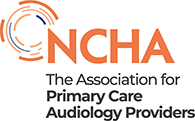28 March 2025
NCHA member update - 28 March
This month:
- Hearing aid sales continue steady growth
- RNID reports ‘unacceptable' lack of progress on ear wax services
- Debate continues after approval for ‘hearing aid' earphones
- Study identifies genetic markers for hearing loss syndrome
- Ears to the ground
- Health policy
Hearing aid sales continue steady growth
The British Irish Hearing Instrument Manufacturers Association (BIHIMA) reported annual growth in hearing aid sales across the board, although sales to the public sector fell 10% compared with the last quarter.
For the first time, it has broken down sales to the NHS into those sold to hospital audiology departments and independent outlets fulfilling NHS contracts. Read the full story.
RNID reports 'unacceptable' lack of progress on ear wax services
The RNID has published a second report for its Stop the Block campaign to improve access to NHS funded ear wax management services in England.
Services remain patchy a year on from the campaign. A map of coverage in England shows just over half of integrated care boards (ICBs) provide a full NHS-funded ear wax removal service, a slight increase from last year. There is no NHS-funded service in six ICBs, down one from the previous year.
The NHS still fails to meet the needs of millions of people with impacted earwax. The RNID estimates that more than two million require regular wax removal. Impacted wax can lead to hearing loss and worsened tinnitus and cause earaches and infections. It can also interfere with hearing aids, prompting some people to stop using them.
Harjit Sandhu, CEO at the NCHA, said: "In 2023, we raised concerns about significant gaps in NHS commissioning and worsening inequalities in accessing wax management services. We also called on the NHS to commission wax management services so people get the right support from the right place at the right time. We fully support the RNID call to action for the NHS in England to follow NICE guidelines and commission ear wax management services locally.
"People who fund their care might pay an average of £60 to remove wax from both ears, while removing ear wax in hospital settings can cost the NHS double this. That is why it is important for the NHS to consider provide wax management services in primary care audiology, it will be good for patients, the NHS and taxpayer."
Debate continues after approval for 'hearing aid' earphones
Australia became the latest country to approve the use of Bluetooth earphones that can be sold as over-the-counter hearing aids for mild-to-moderate hearing loss, The Guardian reports.
The announcement follows the UK's Department of Health and Social Care's decision in January to give the 'green light' to wearable technology with self-fitting hearing aid features to support the government's declared shift in healthcare from analogue to digital.
The changes have received a cautious welcome, with calls for evidence-based and safe ear and hearing care for people with hearing loss. Read the sector's initial guidance on OTC hearing aids in the UK.
In February, Apple made its AirPod hearing test and amplification platform available for the first time in the UK. The debate continues over the likely implications of earbuds with hearing aid features for people with hearing loss and the hearing care profession. Read the latest Which and BIHIMA reports.
Study identifies genetic markers for hearing loss syndrome
Researchers at Manchester University have identified genetic changes that lead to Perrault syndrome, a rare condition that leads to hearing loss, early menopause and infertility. Learning difficulties, developmental delay and nerve damage are common in people with the condition.
In collaboration with colleagues in Newcastle, Germany and the United States, the National Institute for Health and Care Research team found alterations to two genes - DAP3 and MRPL49. The researchers said the discovery will provide an accurate diagnosis, allowing those with Perrault syndrome to receive the right care and support earlier. Read more.
- The British Academy of Audiology has announced an uplift in membership fees from 1 April. The fee for full members will be £90 (up from £82.50)
- A British charity is sending thousands of recycled hearing aids to support people in the military and civilians with hearing damage, ENT & Audiology News reports.
- A literature review suggests vaccination is an underexploited strategy for preventing child and adolescent hearing loss due to a dearth of empirical evidence. Read more.
- New research has found that the auditory brainstem response, a subcortical reaction to sound used in objective measures of hearing, decreases when many people are talking at once.
- Writer and presenter Rev Richard Coles talks to The Standard about how playing in a band damaged his hearing and his journey towards 'revelatory' hearing aids.
NHS England news
NHS England hopes to enhance health service commissioners' skills and professional identity in response to a "perceived devaluing of commissioning", the Health Service Journal reports.
The HSJ has published draft slides that say that the current commissioning cycle "insufficiently engages with the reality commissioners face" due to data issues and "competing asks", making planning ahead challenging.
It is unclear whether the plans will go ahead after the government announced 50% cuts to ICBs and the abolition of NHSE within two years.
The former CEO of NHS England, Sir David Nicholson, said that some ICBs must merge to reduce their running costs under the changes. He added that if costs and staffing were halved, their strategic footprint would inevitably increase. An NHS Confederation report warned that the proposed cuts risked "slowing down the move towards strategic commissioning" and called for carefully management of the cuts.
NHS England named Claire Fuller, who has supported the case for NHS primary care audiology, as the co-medical director for primary care in the team that will help lead its transition into the Department for Health and Social Care. Read more.
Read the NCHA response to the government announcement.
Damning review of CQC digital upgrade
An independent IT review into digital transformation at the Care Quality Commission found a catalogue of failures that have cost the organisation £99m.
The review of the new regulatory platform and provider portal cited recurrent technical problems, poor user experience and challenges data quality.
When staff raised concerns, it added, they felt they were not listened to, resulting in workplace stress and mental health concerns. More than 15,000 incidents were reported to the IT service desk. "The vast majority of the benefits expected to be delivered have not yet been achieved," the report said. It made 23 recommendations for improvement.
Other policy news:
- Wes Streeting has appointed former GP Sir John Oldham to advise the Department of Health and Social Care (DHSC) on plans to shift more care into the community and create a neighbourhood NHS. Read more.
- The Department of Health and Social Care has published its annual corporate report on the performance of the NHS in England, concerning the financial year 2022-2023. The secretary of state's assessment is that "limited progress" was made on continuous improvement in the quality of services provided to individuals, and that there was "minimal progress" in reducing health inequalities.

Press enquiries
Media enquiries should be directed to [email protected] or call 020 7298 5110.
We are happy to put you in touch with our expert policy advisers who can comment on a variety of issues.
You can also follow us on Twitter and LinkedIn.

 Your hearing and aural health
Your hearing and aural health  Commissioners and Policymakers
Commissioners and Policymakers  Member support and guidance
Member support and guidance News and views
News and views
 Hearing map
Hearing map
